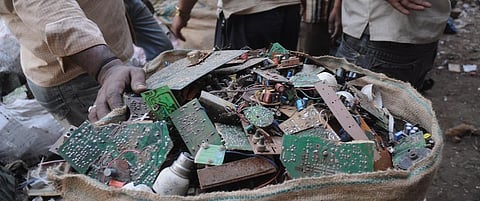

The International Labour Organization (ILO) has asked all nations to take urgent actions to create a safe working environment for workers recycling e-waste.
This happened after representatives of governments and workers’ and employers’ organisations met at the ILO in Geneva.
They decided that governments across the world should “increase and promote investments in waste management infrastructure and systems at all levels, as appropriate, to manage the rapidly growing flows of e-waste in ways that advance decent work”.
“When e-waste is poorly managed, as is the case in many countries, it poses a severe threat to human health and the environment. Workers handling e-waste, their families and those living near disposal sites could be exposed to hazardous substances when no appropriate measures are undertaken,” reads the document that lists the points of consensus they reached at the meeting.
The organisation said the world produces 50 million tonnes of e-waste a year and only 20 per cent of e-waste is formally recycled, even when it is valued at €55 billion (Rs 4.3 lakh crore).
While discussing women participation at the ILO meet the representatives said bad work conditions practices have impacted children and women.
“Workers handling e-waste have no voice, no bargaining power and they are breaking hazardous materials by their hands,” said worker vice-chairperson, James Towers. “Moreover, these workers are unaware of the many risks associated with handling e-waste”.
Asking the governments to look into this matter with urgency, the ILO said they must invest in developing specialised equipment for extraction of valuable metals from the e-waste. “Public-private partnerships could be a useful modality for these investments. Priority should be given to managing e-waste locally, wherever possible,” the document read.
The labour organisation also said most of the e-waste management work in developing countries takes place in the informal economy in poor conditions.
It pitched for formalisation of the informal sector and said the countries must look into the ILO guidelines for a just transition towards environmental sustainability.
According to the document, “The high incidence of informality poses a major challenge for the enforcement of legislation, the growth of sustainable, productive and efficient enterprises, the improvement of the livelihoods and working conditions of e-waste workers.”
The organisation pointed out that to ensure better working conditions for workers, there’s a need for coordination between key ministries and agencies at both state and municipal levels.